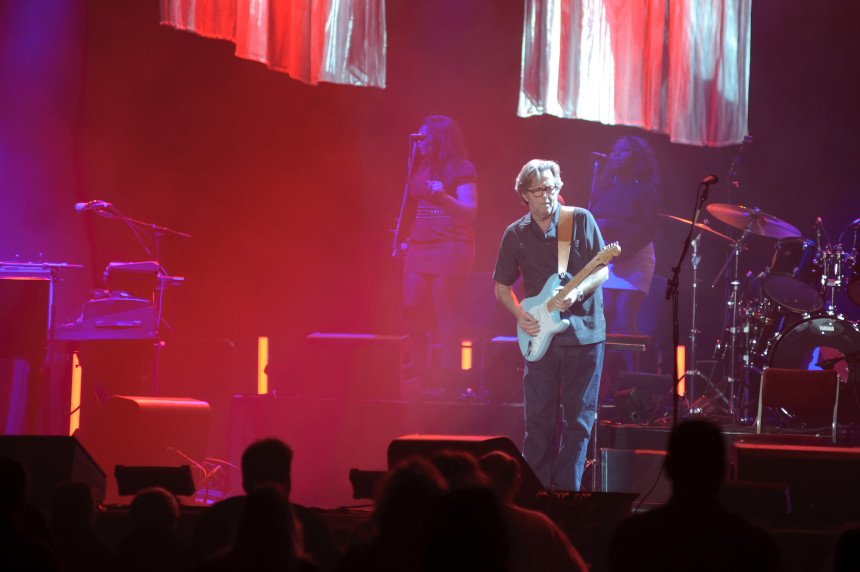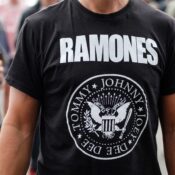If Rock and Roll is mythology and the greats are a pantheon, then Eric Clapton sits on Guitar Olympus. He alone has been inducted into the Rock and Roll Hall of Fame on three separate occasions. He’s sold over 100 million records, won 18 Grammys, and been named a Commander of the British Empire for his “services to music.” When Rolling Stone assessed the 100 Greatest Guitarists, Clapton was named #2, second only to Jimi Hendrix. And though he made his professional breakthrough in 1963, it would seven long years before Clapton made his solo debut. Along the way, he would rack up impressive group memberships and the credentials that would earn him two of those Hall of Fame berths. Here’s how the man they call Slowhand found the spotlight.
Young Clapton got a guitar for his thirteenth birthday, but didn’t begin to play seriously until two years later. Already an avid blues fan, Clapton learned by playing along with records and grew in skill by taping himself and listening for flaws that he could improve. In his late teens, Clapton began to gig around Greater London. In October 1963, when Clapton was 18, he joined The Yardbirds. One of three iconic guitarists to have a tenure in the band (the other two being Rolling Stone Top 5 mates Jimmy Page and Jeff Beck), Clapton drew immediate attention for his blues-inspired playing. Club owner and music scenester Giorgio Gomelsky dubbed Clapton “Slowhand” after witnessing the audience slowly clap while Clapton changed a broken guitar string on stage; many musicians would step aside for such a fix, but the crowd maintained their slow clap for the musician until he was ready to play again.
Cream playing “Sunshine of Your Love” at their Rock and Roll Hall of Fame Induction in 1993 (Uploaded to YouTube by Rock & Roll Hall of Fame)
Clapton stuck around with The Yardbirds until 1965, when he tired of their increasingly poppier direction. He played with John Mayall & the Bluesbreakers until 1966, appearing on one album (Blues Breakers with Eric Clapton) that featured bassist John McVie (who later co-founded Fleetwood Mac) and bassist Jack Bruce. Drummer Ginger Baker invited Clapton to join him and Bruce in a new band, Cream. Cream turned out to be a major success, both artistically and commercially. All three musicians had virtuosic talent, and they produced hit singles like “Sunshine of Your Love” and “White Room” that stayed true to their psychedelic-blues aesthetic. Live audiences were treated to jams and improvisations that would go on for many minutes within songs, increasing their reputation among fans and their standing among other musicians. During this era, Clapton continued to collaborate with outside musicians, appearing on albums by the likes of Frank Zappa and playing the guitar solo on The Beatles’ “While My Guitar Gently Weeps.” He also appeared in John Lennon’s single-serve band The Dirty Mac in the Rolling Stones’ concert film, The Rolling Stones Rock and Roll Circus.
The Dirty Mac doing “Yer Blues” with Eric Clapton on lead guitar (Uploaded to YouTube by ABKCOVEVO)
By the end of 1968, Cream had imploded amid infighting between members. However, Baker and Clapton formed another group in 1969, this time with Steve Winwood (known for Traffic) and Ric Grech. That band, Blind Faith, released one six-song album and did one tour, but is still regarded as a top-notch “supergroup” of stars. Clapton went one to do side gigs with the duo Delaney and Bonnie Bramlett (known simply as Delaney and Bonnie) and was a de facto member of Lennon’s Plastic Ono Band, playing with them in concert and on Lennon’s solo single, “Cold Turkey.”
“After Midnight” by Eric Clapton (Uploaded to YouTube by Eric Clapton / Universal Music Group)
After being something of the ultimate groupmate, Clapton finally took the plunge into solo artistry. His self-titled debut, Eric Clapton, was released 50 years ago this week. Clapton employed Delaney & Bonnie’s back-up musicians on the record. Stars Stephen Stills and Leon Russell also provided guest-spots. Delaney Bramlett produced the record and co-wrote six songs; Bonnie co-wrote one. Clapton included a cover of J.J. Cale’s “After Midnight,” and it became a hit, eventually reaching #18 in the United States. It became one of Clapton’s signature tunes.
Clapton does “Layla” at Live Aid (Uploaded to YouTube by Live Aid)
Perhaps humorously, Clapton would form another band and release an album before 1970 was even finished. He, keyboardist/vocalist Bobby Whitlock, drummer Jim Gordon, and bassist Carl Radle released one album as Derek and the Dominos. Layla and Other Assorted Love Songs contained the epic title track, “Layla,” which featured Duane Allman on guitar and was an ode to Clapton’s feelings for Pattie Boyd, the wife of his friend, George Harrison of The Beatles. The sprawling tune, with its two distinct sections, became a staple of rock radio, finally hitting #10 in 1972.
Unfortunately, the first few years of the 1970s took a dark turn for the musician. He struggled with drugs and alcohol and stayed out of the limelight aside from playing for Harrison’s Concert for Bangladesh in 1971 (during which he passed out on stage, but recovered to finish his set). Clapton’s friend, Pete Townshend of The Who, took an active role in getting Clapton back on stage, even putting together the “Rainbow Concert,” a performance at the Rainbow Theatre in London in 1973 that resulted in a live album. The next year, Pattie Boyd left Harrison and moved in with Clapton; the two were ultimately married 1979, but separated by 1987 with a finalized divorce in 1989.
Clapton doing “Wonderful Tonight” live (Uploaded to YouTube by Warner Records Vault)
Townshend’s efforts to put Clapton back on a solo trajectory worked, and he would remain a major presence in the world of rock. His cover of Bob Marley’s “I Shot the Sheriff” would be a huge hit in 1974, followed by big singles like his 1976 J. J. Cale cover “Cocaine” and 1977’s “Wonderful Tonight.” The 1980s saw Clapton working continually, guest-starring on projects by the likes of Harrison and Roger Waters, playing on big stages like Live Aid, contributing songs for films (The Color of Money) and commercials, and recording his own new material, like the 1989 album Journeyman, which went Top 20 in the States.
”Pretending” from Journeyman (Uploaded to YouTube by Eric Clapton)
The 1990s began with two tragedies in Clapton’s life. First, his friend and tourmate Stevie Ray Vaughan and three of their crew members died in a helicopter crash on August 27, 1990. The following March, Clapton’s four-year-old son died after falling from a window in his mother’s friend’s New York City apartment. Clapton channeled his devastation into the song “Tears in Heaven,” which, along with his MTV Unplugged album that also featured the song, earned six Grammys. The #1 single sold more than 10 million copies in the U.S.
In the years since, Clapton has never stopped touring, making albums, and collaborating. He has four children with his wife of 18 years, Melia McEnery, and an older daughter, Ruth, from a previous relationship. His prodigious body of work has brought him an avalanche of accolades. As mentioned previously, he’s a three-time inductee of the Rock and Roll Hall of Fame: as a member of The Yardbirds, as a member of Cream, and as a solo artist. He’s very active with a number of charities, frequently performing at or organizing events; he also founded the Crossroads Centre in Antigua for addiction treatment. The asteroid 4305 Clapton is named in his honor.
The notion of a “rock and roll survivor” is something of a cliché, but it fits him as well as the descriptor “bluesman.” A student of the form and a powerful force of its use in rock, Clapton rose among peers to be regarded as among the best in the world. Over the decades, he’s built on that legend with seemingly endless collaborations and sterling musicianship. He sang, “It’s in the way that you use it,” and it’s hard to find somebody that used it better.
Featured image: Randy Miramontez / Shutterstock
Become a Saturday Evening Post member and enjoy unlimited access. Subscribe now




Comments
Whether he’s performing solo, as a member in one of various groups over the years, or even on film, Eric Clapton stands alone in the music industry, as one of its most gifted and versatile artists. Perhaps more importantly in his personal life, marred by unthinkable tragedies, he’s never given up when a lot of us would have.
He continues to this day creating new music, and I wish him all the best in doing so for still many more years to come in good health. When the time comes, he’ll be joyfully reunited with his son, ending the sadness of this earthly life he’s had to endure and learn to cope with. I have no doubt his music has helped, tremendously.